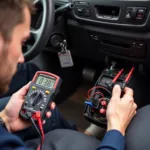Discovering a paint chip on your car can be disheartening, but thankfully, most minor chips are easily fixable. This guide provides all the information you need to understand car paint chip repair, from DIY solutions to professional options, empowering you to make the best decision for your vehicle.
Understanding Car Paint Chips
Before diving into repair solutions, it’s crucial to understand what car paint chips are and what causes them. Car paint isn’t just for aesthetics; it provides a protective layer against the elements. When this layer is compromised, your car becomes vulnerable to rust and corrosion.
Chips are small areas where the paint has chipped off, exposing the underlying layers. Common culprits include:
- Road Debris: Small rocks, gravel, and other debris kicked up by tires are the most frequent cause of paint chips.
- Minor Accidents: Parking lot mishaps, minor collisions, or even bumping into objects can lead to paint chips.
- Weather Conditions: Hail, extreme temperatures, and prolonged exposure to sunlight can weaken the paint, making it prone to chipping.
DIY vs. Professional Car Paint Chip Repair
The approach to repairing paint chips depends largely on the severity of the damage and your comfort level with DIY projects.
DIY Car Paint Chip Repair
For minor chips that haven’t penetrated the primer layer, DIY repair kits can be a cost-effective solution. These kits typically involve:
- Cleaning the area: Use soap and water to remove dirt and debris.
- Applying touch-up paint: Carefully apply the matching paint to the chipped area using the provided brush or pen applicator.
- Leveling the surface: If necessary, use a rubbing compound to smooth out the repaired area and blend it with the surrounding paint.
Pros:
- Cost-effective: DIY kits are significantly cheaper than professional repairs.
- Convenient: Repairs can be done at your own pace and convenience.
Cons:
- Limited to minor chips: DIY kits are not suitable for deep scratches or chips that have penetrated multiple paint layers.
- Color matching challenges: Achieving a perfect color match can be tricky, especially with older vehicles where the paint may have faded.
Professional Car Paint Chip Repair
For larger chips, deep scratches, or when a perfect finish is desired, seeking professional best paint chip repair for cars is recommended. Professionals have the expertise and tools to deliver high-quality repairs, which may include:
- Sanding: Smoothing down the damaged area and preparing it for paint application.
- Priming: Applying a primer layer to create a smooth and even base for the paint.
- Painting: Matching the existing paint color and applying it in thin, even coats.
- Clear coating: Applying a protective clear coat to seal and protect the repaired area.
Pros:
- High-quality finish: Professionals can achieve a seamless repair that’s virtually invisible.
- Long-lasting results: Professional repairs are more durable and less likely to chip or fade over time.
Cons:
- Higher cost: Professional repairs are more expensive than DIY solutions.
- Time commitment: Depending on the severity of the damage, professional repairs may require you to leave your car at the shop for a few days.
Choosing the Right Repair Option
The choice between DIY and professional car paint chip repair near me ultimately depends on your individual needs and preferences. Consider the following:
- Severity of the damage: DIY kits are suitable for minor chips, while deeper damage requires professional attention.
- Budget: DIY is more budget-friendly, while professional repairs offer a higher level of quality and longevity.
- Desired outcome: If you’re aiming for an invisible repair, professional expertise is the way to go.
Preventing Future Car Paint Chips
While some paint chips are unavoidable, there are steps you can take to minimize the risk:
- Regular washing and waxing: Keeping your car clean and protected with a layer of wax can help prevent minor chips.
- Careful parking: Parking away from construction zones and areas prone to flying debris can reduce the likelihood of chips.
- Paint protection film: Consider applying a clear paint protection film to vulnerable areas like the hood, bumpers, and mirrors.
“Remember,” says John Smith, Senior Automotive Technician at XYZ Auto Body, “addressing paint chips promptly can prevent further damage and maintain your car’s value. Even minor chips, if left untreated, can develop into rust and corrosion, leading to more costly repairs down the line.”
Conclusion
Car paint chips are a common occurrence, but they don’t have to be a major headache. By understanding the different repair options, you can make an informed decision that best suits your needs and budget. Whether you opt for a DIY kit or professional florida car paint chip repair service, addressing paint chips promptly is crucial for maintaining your car’s appearance and value.


